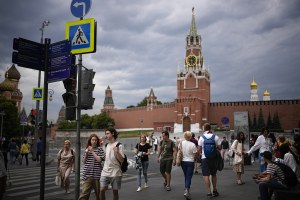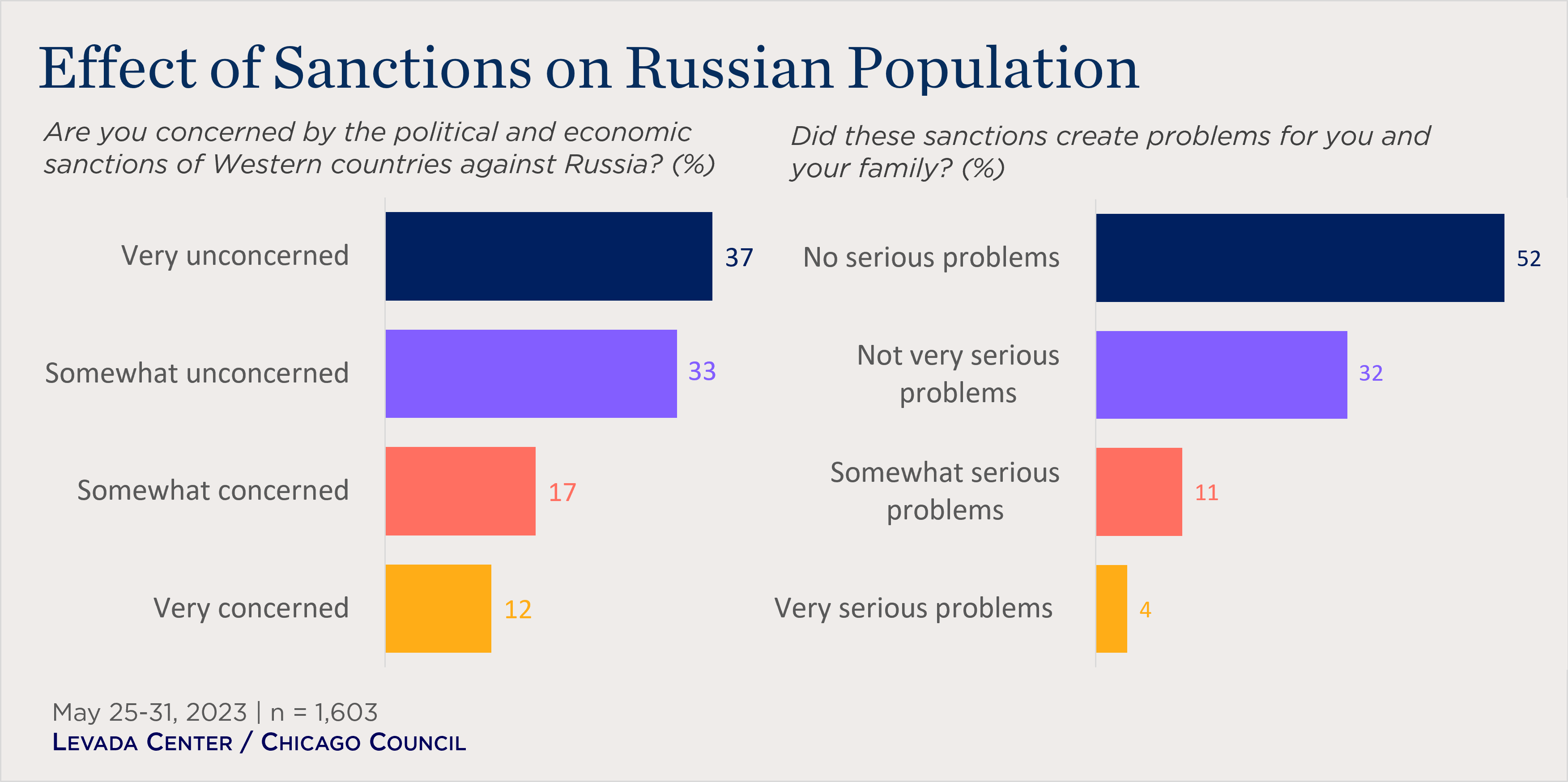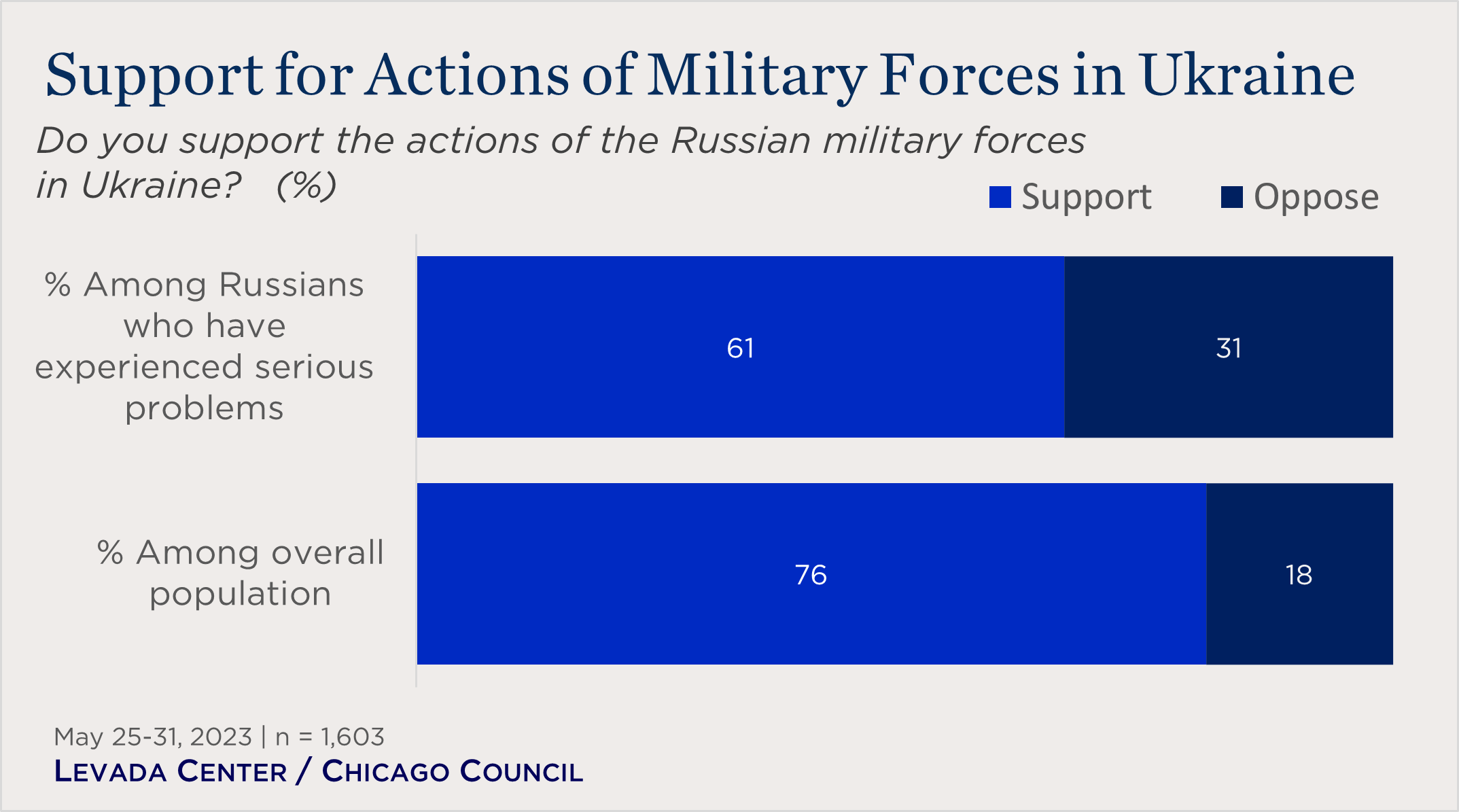Russians report limited impact of Western-imposed sanctions and continued support for the war in Ukraine.
In a unified effort to curtail Russia’s most recent military operation in Ukraine, the United States, the European Union, and their allies continue to impose sanctions packages and export controls on Moscow. According to the US Department of the Treasury, the cumulative impact of the sanctions has significantly eroded Russia’s military capacity, defense supply chains, and key sectors of its economy. However, polls show that it has not affected the daily lives of most Russians. A May 25–31, 2023, Chicago Council-Levada Center survey and April 2023 focus group discussions reveal that most Russians have grown less concerned about the sanctions and are not directly affected by them. The minority of Russians who say they have been affected by the sanctions may be expressing discontent with the socioeconomic conditions created by the war in Ukraine rather than a tangible impact of the sanctions and export controls levied against Russia.
Key Findings
- A strong majority of Russians (70%) are not concerned by the sanctions imposed on Russia, while 29 percent of Russians remain concerned. This is the lowest level of concern reported since 2017, when only 28 percent of Russians reported feeling concerned about the sanctions.
- Eight in 10 Russians report that the sanctions levied against Russia have not created serious problems for themselves or their families, while 15 percent say they have experienced somewhat or very serious problems.
- A majority of those who say they have experienced serious problems as a result of the sanctions imposed on Russia express support for the actions of the Russian military forces in Ukraine (61%), though at a lower level than the overall population (76%).
- Russians who report experiencing serious problems as a result of the sanctions have the same median income as those who do not report experiencing serious problems. They are also more likely to voice more favorable views of the West and are more disapproving of Russian President Vladimir Putin than the general public.
Fewer Russians Now Concerned about Sanctions
The Russian economy remains relatively resilient, despite Russia being one of the world’s most sanctioned countries, with almost 13,000 restrictions spanning government officials, imports and exports, financial institutions, and companies in key economic sectors. To counter these penalties, Moscow has turned to other trading partners like China, Turkey, and India to maintain its footing amid an already costly war without decreasing living standards for the Russian population and triggering political backlash.
The majority of Russians (84%) report that the sanctions have not created serious problems for themselves or their families—the highest percentage reported since 2014, when sanctions were first imposed on Russia for taking control of Crimea (at which point, 79% did not experience serious problems). On the other hand, only 15 percent of Russians say they have experienced somewhat or very serious problems as a result of the sanctions; this is also the lowest percentage reported since 2014 (when 16% reported experiencing serious problems). Similarly, the majority of Russians (70%) say they are not concerned by the sanctions levied against Russia, while fewer than a third (29%) remain concerned. Today, Russians are 17 percentage points less concerned about the sanctions than they were in March 2022, at the onset of the military operation in Ukraine (when 46% were concerned). Notably, lack of concern about the sanctions among Russians is at its highest level since 2014.
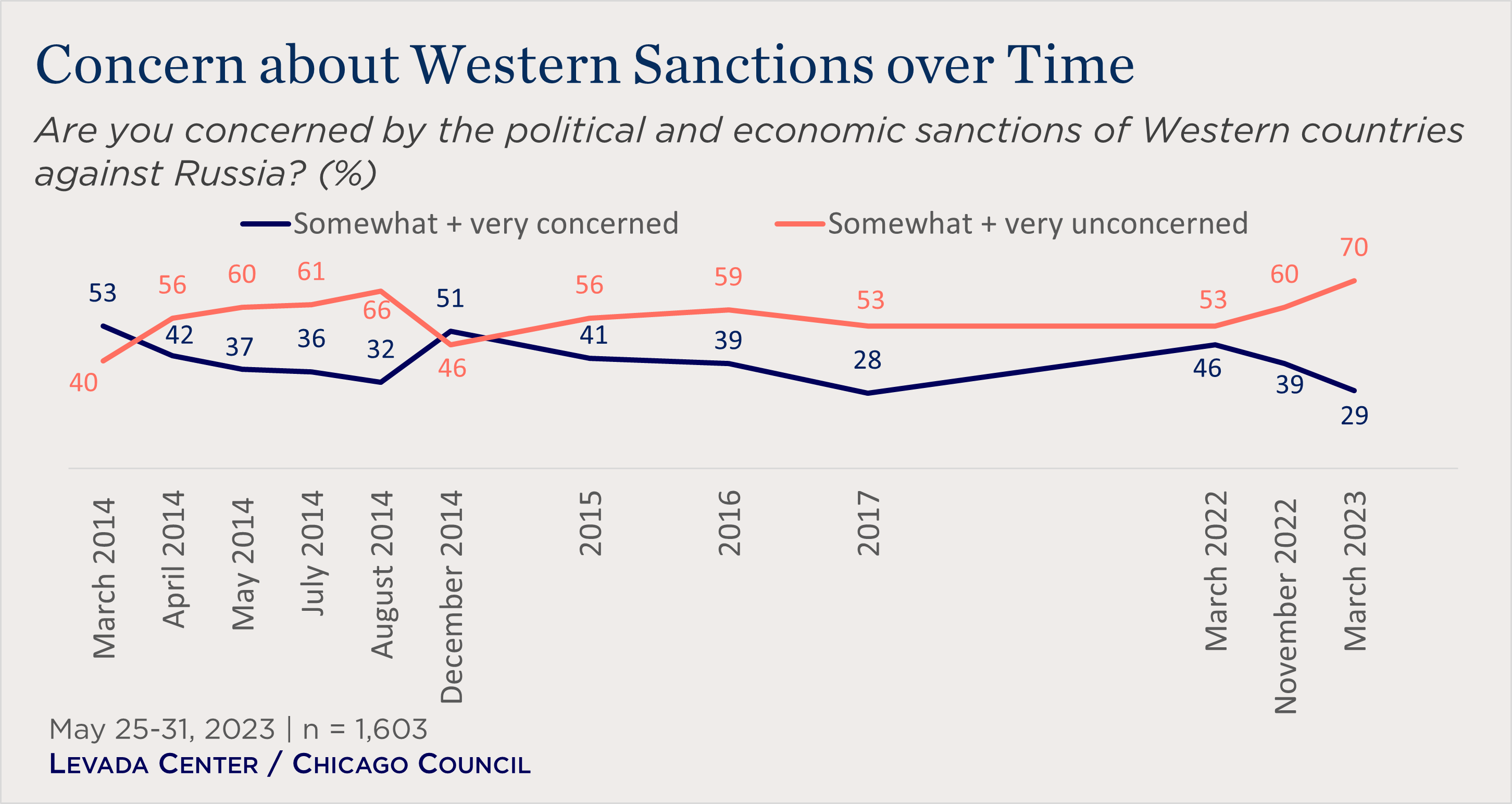
Conversations with focus group participants in Moscow (one with a group of men and another with a group of women) reveal that some Russians expected a greater economic strain from the sanctions than they experienced over the last year. One individual reported being “pleasantly surprised that despite all the sanctions, Russia pulled through; although no one in the world had thought that 11 sanction packages would be introduced, we are still afloat.” Another participant noted that “despite the sanctions and the sort of closed borders, everyone still flies easily around the world through Turkey.”
However, when asked about import substitution, participants asserted that “we did not start producing more of anything; we are just buying things in China” and “we still haven’t replaced all the imported goods, we still do not know how to make a lot of things and will not soon learn how to produce.” One participant gave examples of how import substitution is falling short: “many goods have left the market...and the fact that we have no analogues for those goods that have left the market is also a big problem, including medicines, and the automotive industry.”
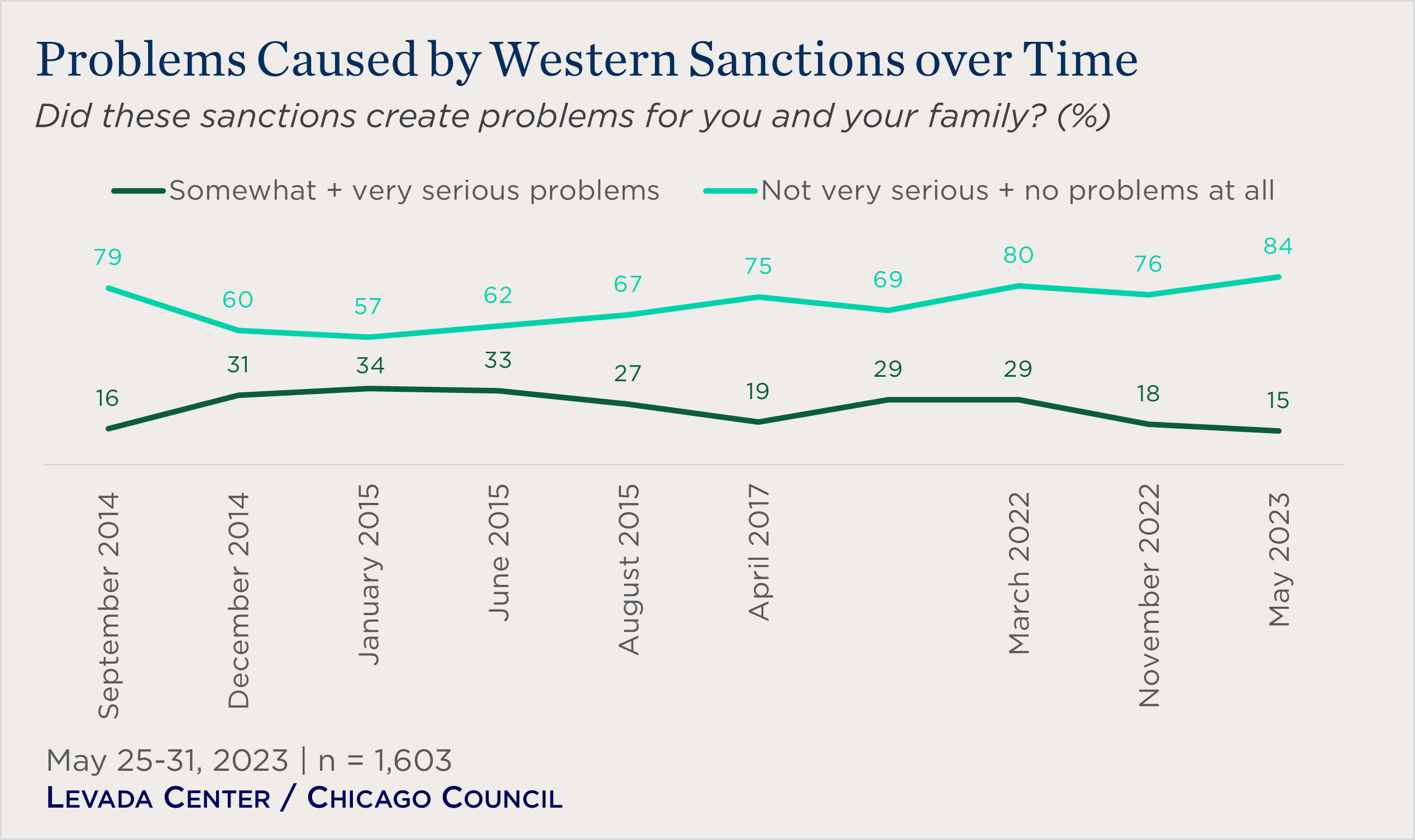
Bleak Economic Outlook among Affected Russians
Chicago Council-Levada Center polling also provides insight into how Russians perceive their economic status and household financial situation amid the war in Ukraine. Today, 43 percent of the population report they can only afford food and clothing, 12 percent report they can only afford food, and 5 percent report they cannot even afford food. In contrast, only 29 percent of the population say they can afford to buy a new domestic appliance, and an even smaller amount (6%) can afford to buy a new car; at the moment, only 3 percent of the population can afford to buy an apartment. While still bleak, Russians’ perceptions of their household financial conditions have improved since the start of the military operation in March 2022, perhaps reflecting a sense of relief that the Russian economy has weathered the effects of Western-imposed sanctions.
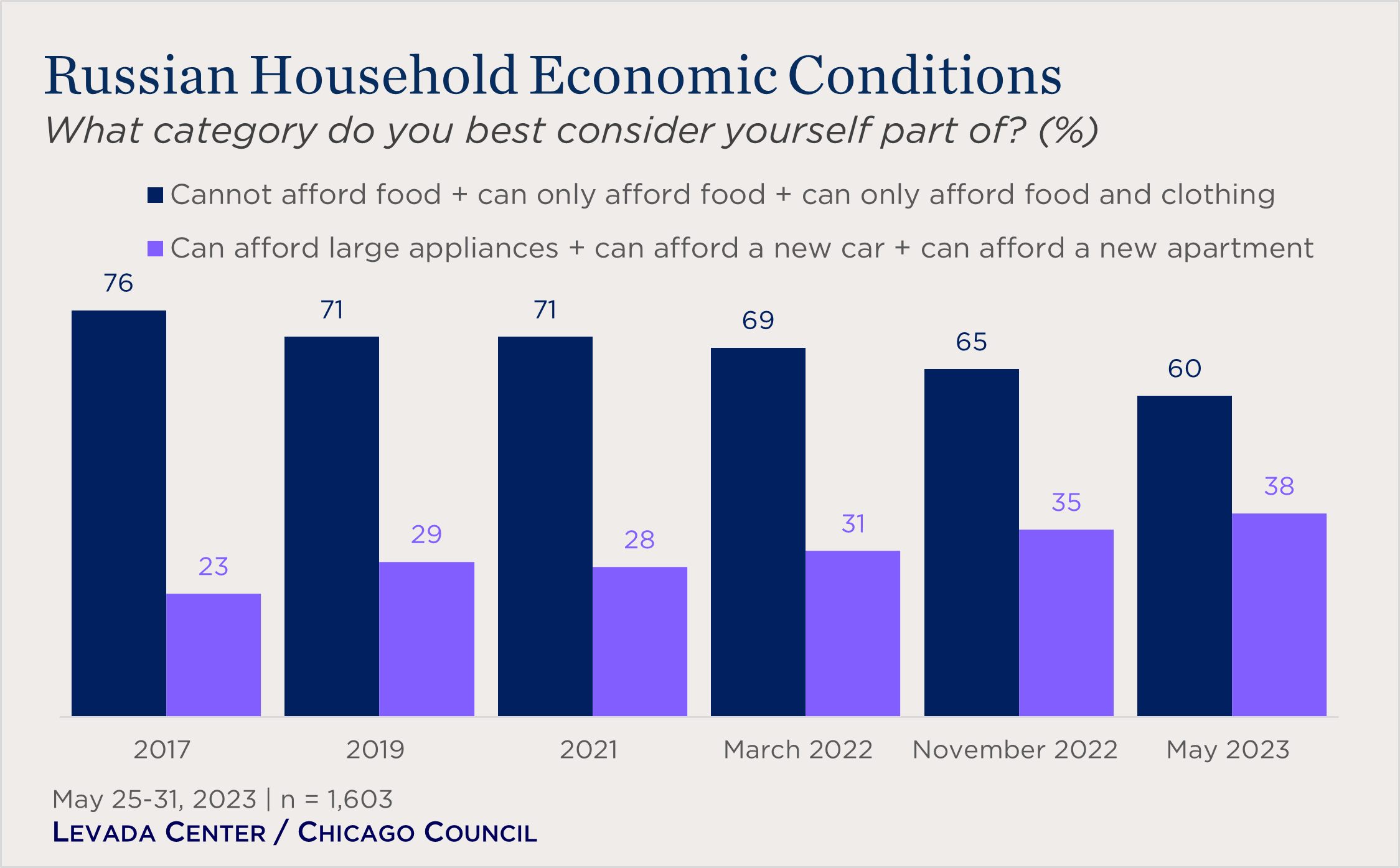
Western sanctions have been designed to target and concentrate their impact toward Russian elites and oligarchs rather than everyday Russians; the data suggest that the sanctions are working as intended, as they have mostly spared the public from additional economic hardship. The median per capita income among those affected by the sanctions (those who say the sanctions have created serious problems for themselves or their families) and the overall population are about the same.
Polling also shows that Russians who are affected by the sanctions are more likely to disapprove of Vladimir Putin (36% vs. 15% overall) and have more favorable views toward the United States (23% vs. 12% overall) and the European Union (27% vs. 16% overall) than the overall population. Taken together, the data might indicate that Russians who report experiencing serious problems as a result of the sanctions may be more pessimistic about their socioeconomic situations than the general public because of a combination of their less negative views of the West, less positive attitudes toward Putin and the war in Ukraine, and the impacts the war has had on their lifestyle.
Sanctions Don’t Have Much Bearing on Support for Military Action
As the Russian military operation in Ukraine enters its 16th month, the United States, the European Union, and their allies continue to expand and strengthen the sanctions and export controls they have levied against Russia in hopes of pressuring Moscow to enter peace negotiations.
The survey data show a modest relationship between Russians who have experienced serious problems as a result of Western-imposed sanctions and support for the Russian military operation. Those affected by the sanctions are only 13 percentage points more likely to oppose the actions of the Russian military forces in Ukraine than the general public (31% vs. 18% overall), and still overwhelmingly support the military operation.
Although they largely support the actions of the Russian military forces in Ukraine, Russians who say they have been affected by the sanctions are, interestingly, 21 percentage points more likely to consider the military operation more damaging than beneficial to Russia than the general public (62% vs. 41% overall). There are also differences in attitudes toward negotiations between those who have been affected by the sanctions and the general public: those who have reported experiencing serious problems as a result of the sanctions are 14 percentage points more likely to prefer negotiating over continuing the military operation in Ukraine than the general public (59% vs. 45% overall).
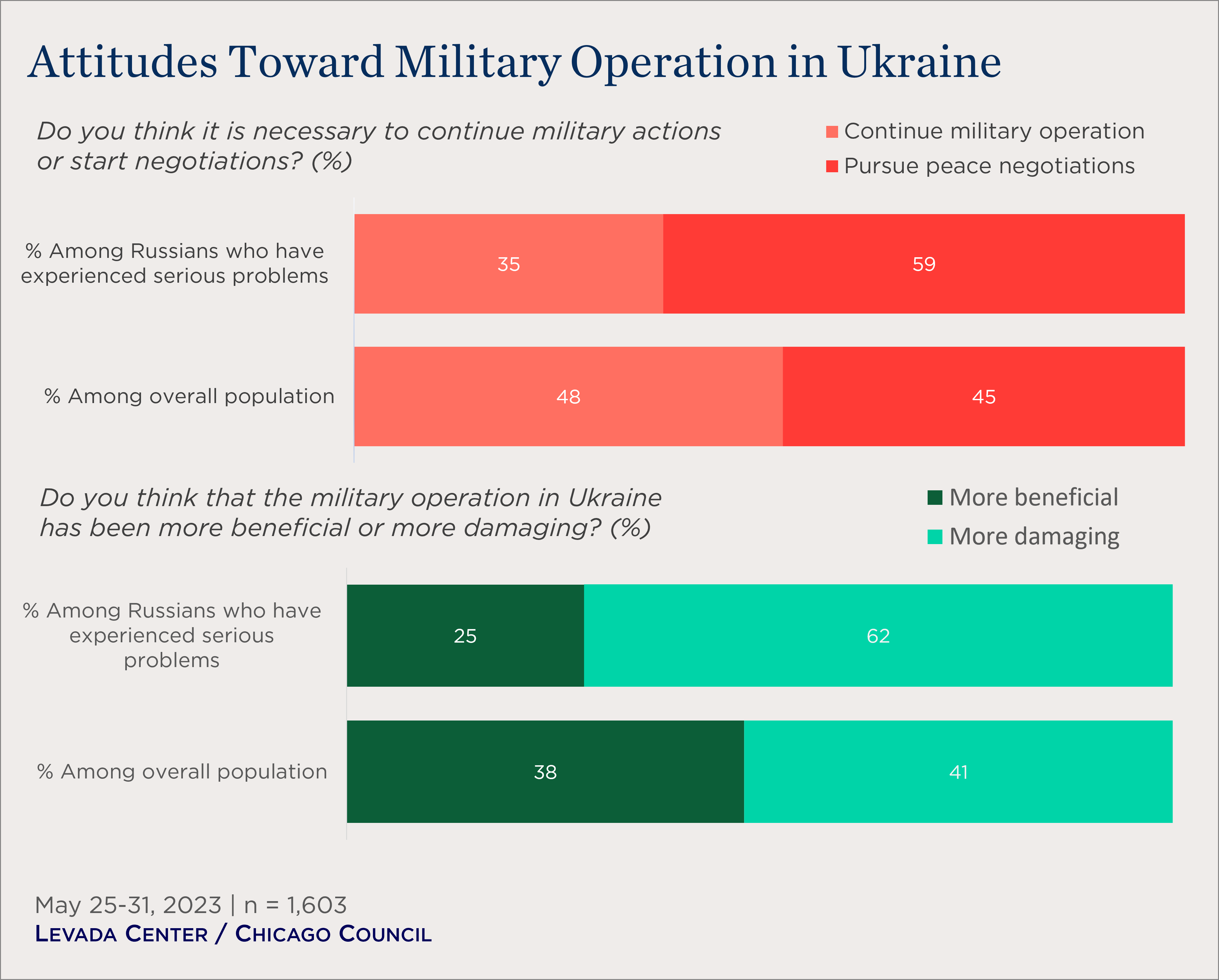
Among focus group participants, the consensus is that Russia should not make concessions for the sake of lifting sanctions, since, according to one individual, the policy of sanctions relief in exchange for some compromises is “more beneficial to other countries than to Russia.” It is evident that because most Russians are unaffected by the sanctions levied against Russia, they feel no pressing desire or economic motivation to enter negotiations or make concessions to Ukraine and the West.
Conclusion
Of all the weapons in its diplomatic armory, economic sanctions and export controls seem to be the ammunition of choice for the United States to address Russia’s military operation in Ukraine. Although the continued efforts of the United States and its allies to end the war through economic coercion are not yet bearing the intended fruit of getting the Kremlin to withdraw Russian forces from Ukraine, data from this survey show that at the very least, the West has been successful in sparing the Russian population from additional economic strain.
This survey was part of Levada's monthly omnibus survey. The full methodology can be found on their website.
For this particular wave of the Levada Center's monthly omnibus survey, the interviews were conducted between May 25-31, 2023 among a representative sample of all Russian urban and rural residents. The sample was comprised of 1603 people aged 18 or older in 138 municipalities of 50 regions of the Russian Federation (including Crimea). The survey was conducted as a personal interview in respondents' homes. The answer distribution is presented as percentages of the total number of participants along with data from previous surveys.
The statistical error of these studies for a sample of 1600 people (with a probability of 0.95) does not exceed:
- 3.4% for indicators around 50%
- 2.9% for indicators around 25%/75%
- 2.0% for indicators around 10%/90%
- 1.5% for indicators around 5%/95%
This work is made possible by the generous support of the Carnegie Corporation of New York.
The group discussions were conducted on April 20, 2023, at the Levada-Center’s Studio, among eight men and eight women 20 and older. Participants were selected by professional recruiters in Moscow using the “snowball” method through recruiters’ networks as well as those of previous participants of Levada-Center’s focus groups and were screened by age and gender. Anyone who participated in a focus group less than one year before this study and worked in marketing or political and social sciences was excluded from the selection process. All 16 participants represented average Muscovites with some level of awareness about political news and with a variety of political attitudes.








Related Content
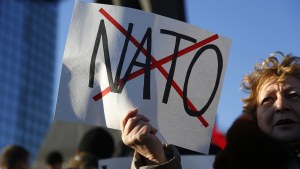 Public Opinion
Public Opinion
The Russian public is concerned about NATO expansion but does not think an attack from the West is imminent.
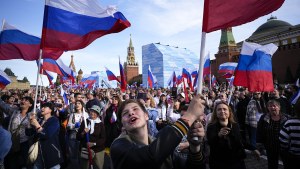 Public Opinion
Public Opinion
While many Russians favor negotiating for peace with Kyiv, they are unwilling to give up any Ukrainian territory seized since 2014. They are, however, more open to a “neutral” status for eastern Ukraine.
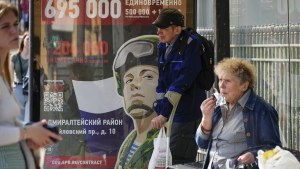 Public Opinion
Public Opinion
While a majority continue to express support for the war and more now sense the military operation has been successful, the Russian public is divided on whether it has led to more positive or negative consequences.
 Public Opinion
Public Opinion
But those feeling an economic pinch are more likely to say that Moscow should enter peace negotiations.
